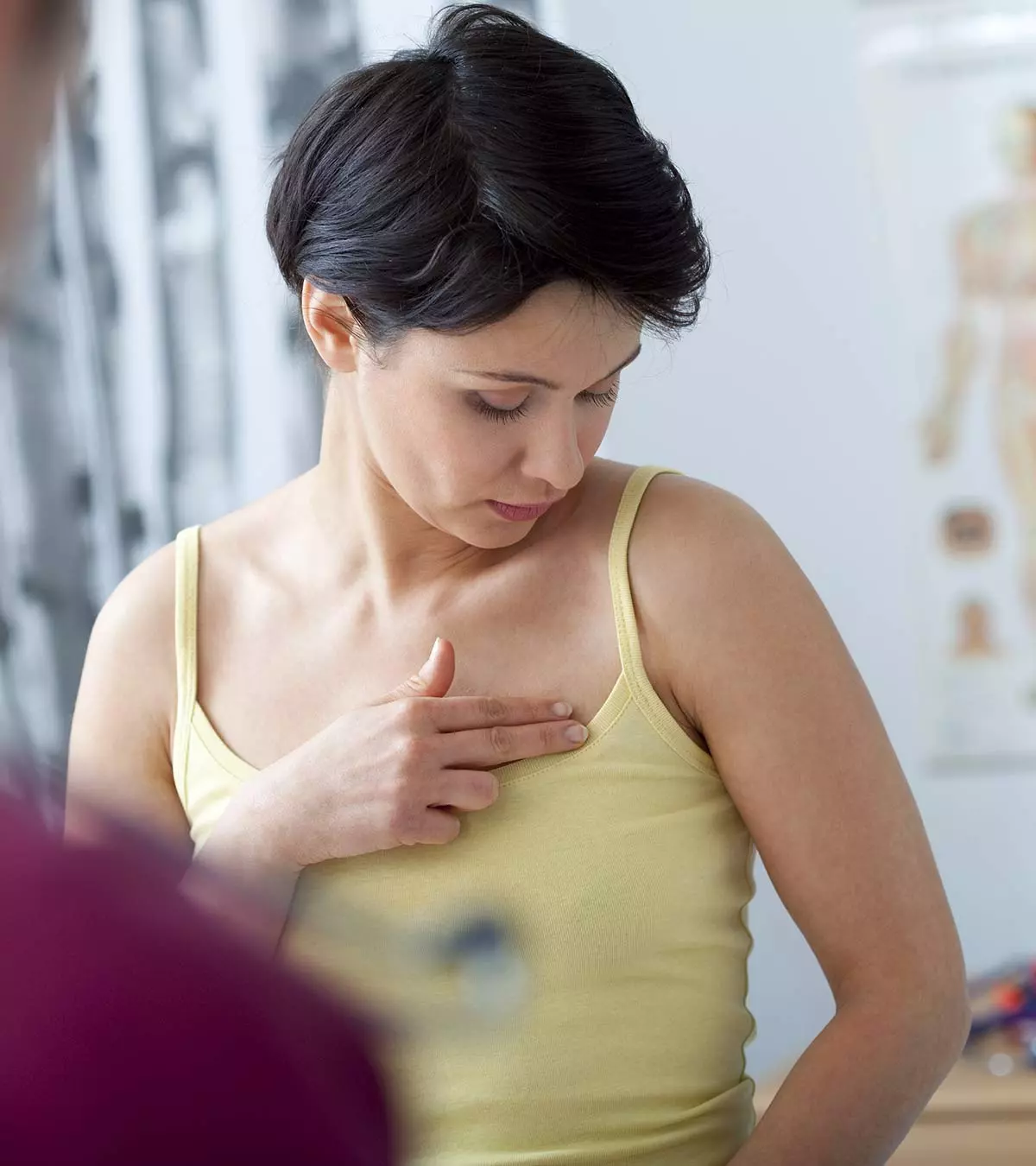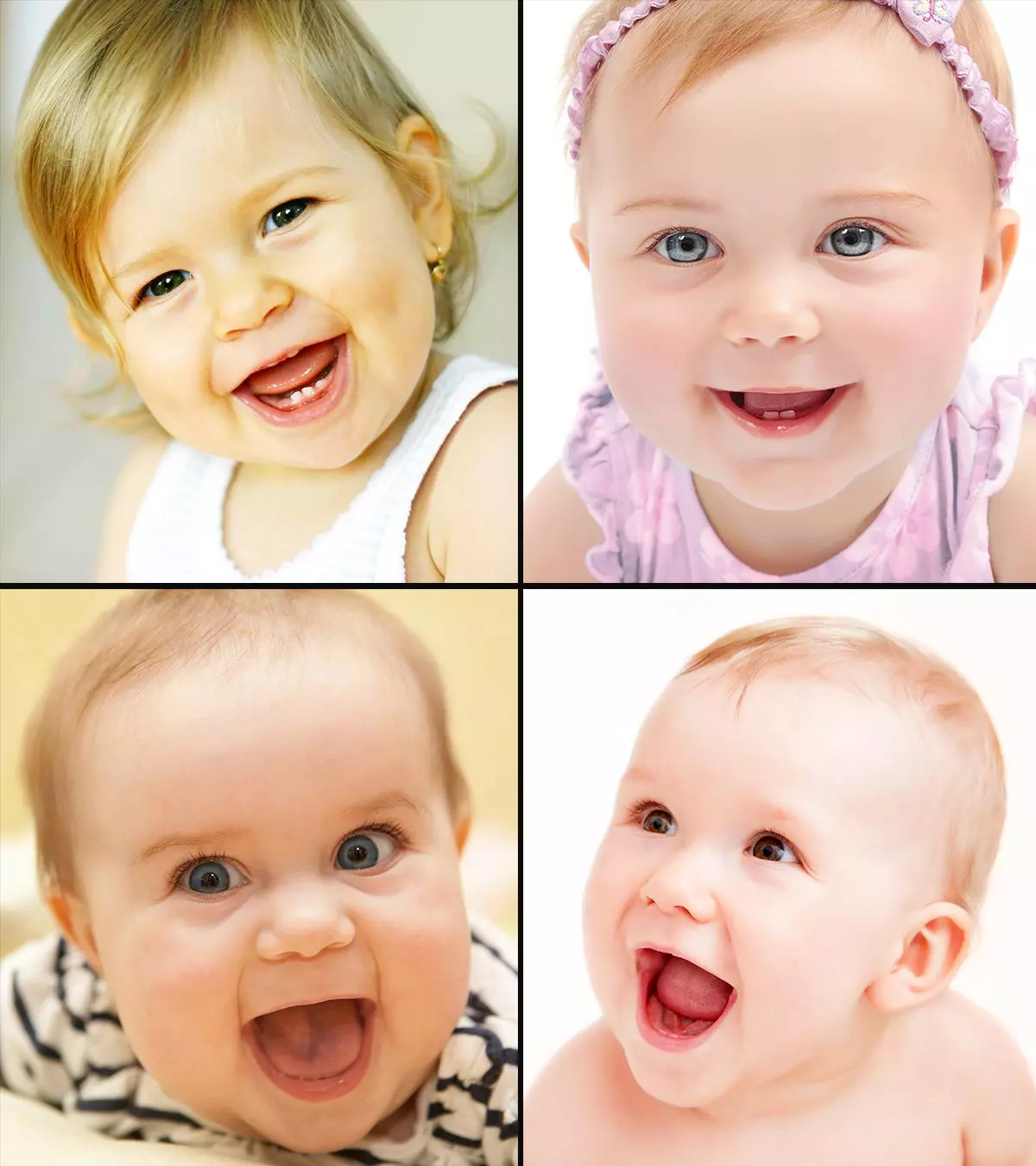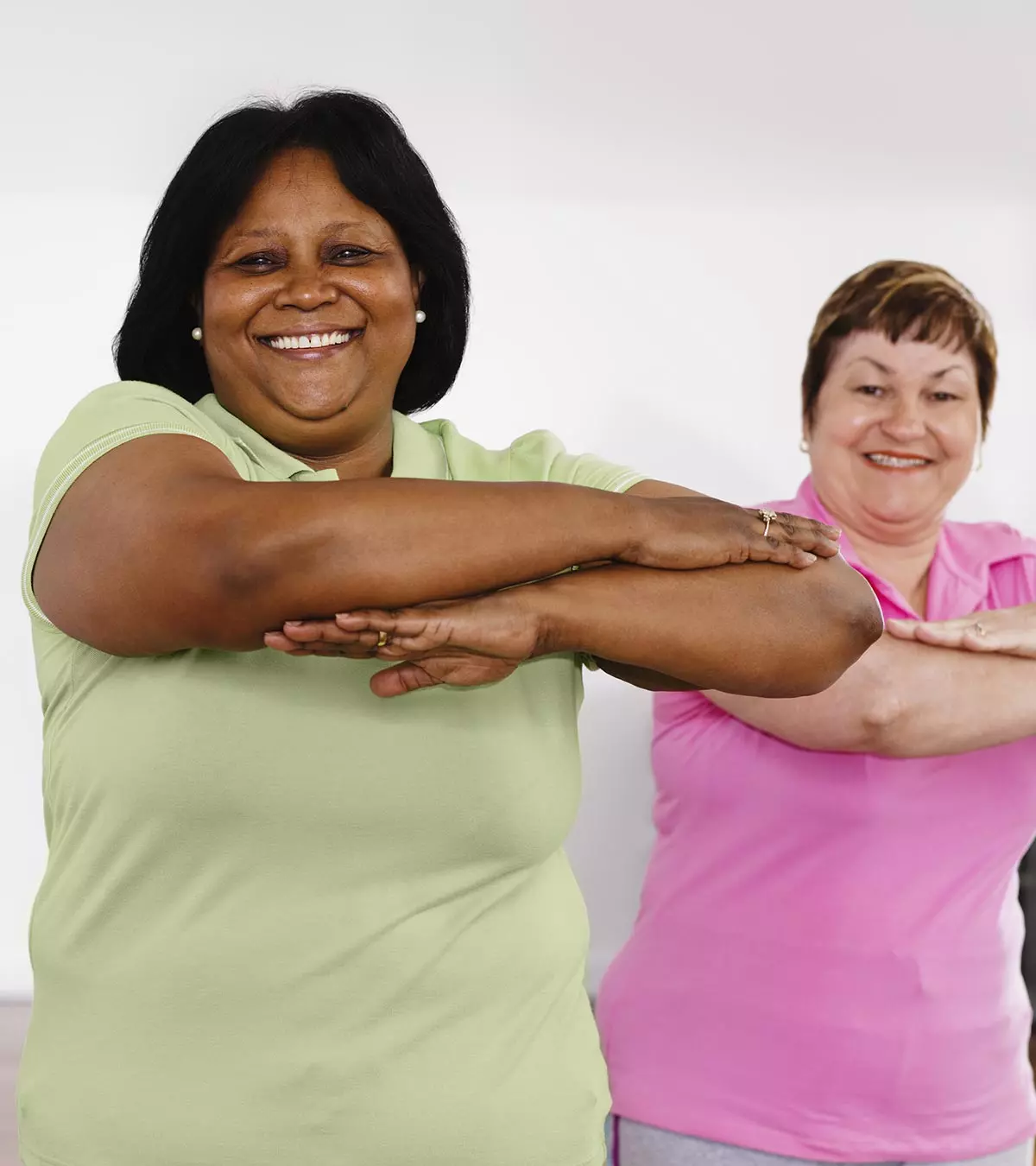
Image: Shutterstock
Many people ponder how to get rid of baby fat on face because it gives a chubby look with a broad face and puffy eyes. Fat on the face can be caused due to different reasons such as obesity or lack of sleep. Finding the cause behind the baby fat on your face can help you tackle the issue. Also, you need to tone your face by following a healthy diet and working out regularly. Reducing fat just from the face (spot reduction) is not possible unless you decide to have surgery. A good and healthy non-surgical facial contouring can be achieved by losing extra weight from the entire body. Read the post to learn more about what causes baby fat on the face and the effective ways to get rid of it.
Key Pointers
- Baby fat on the face may occur due to obesity, lack of sleep, water retention, and side effects of steroidal medications.
- Consuming a less salt and sugar-based diet, including more fruits, increasing water intake, avoiding stress and alcohol, and increasing low-fat dairy intake can help tone the facial muscles.
- In addition, doing facial exercises, chewing gum, blowing out air, and cardio exercises, and weight training can reduce facial fat, strengthen the jaw, and address obesity.
- Finally, getting ample sleep and alternating medications can help reduce sleep deprivation and medication-induced facial fat, and combat hormonal imbalance.
Causes Of Facial Bloating
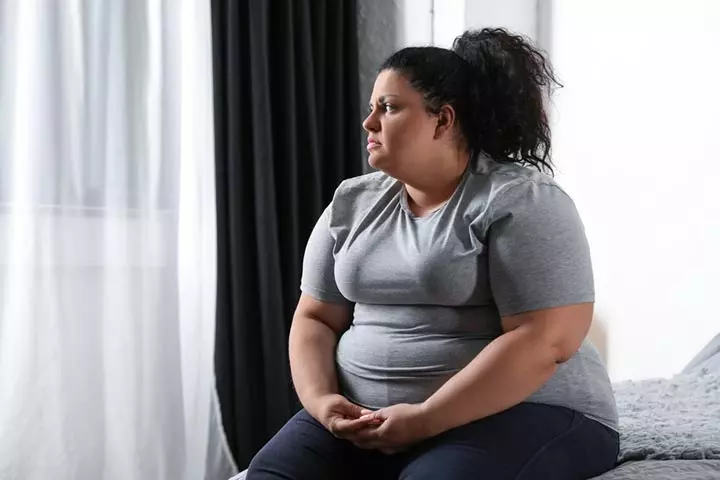
Some of the main reasons for the accumulation of fat on the face are:
- Obesity: Being overweight can also enlarge your facial volume as it will add layers of fat on your cheeks and chin (1).
- Water Retention: Drinking less water can make your body retain fluid and make your face look swollen (2).
- Lack Of Sleep: Stress and sleep disorders can take a toll on your skin’s elasticity making it appear saggy and large (3).
- Side Effects of Medication: The use of steroid medications like prednisone may also make the face look bloated (2).
 Quick fact
Quick fact
Tips To Reduce Facial Fat
1. Check your diet
- Count your calories
Note down all the food items you consume in a day and the calorie count of each. You can identify the unhealthy foods and avoid eating them. Having a low-calorie diet and cutting down on your calorie intake doesn’t mean you need to starve. You just need to make a few healthy eating habits! You can avoid junk food and munch on a fruit or salad instead. Also, regulate your salt and sugar consumption.
Chris Dempers, ACSM EP-C, a health and fitness specialist at the Cleveland Clinic, says, “Anyone following a healthy diet and exercising an hour a day will lose weight and see it in their face (4).”
- Drink Lots Of Water
If your fluid intake is minimal, your body will end up retaining water making your cheeks look chubby, and your eyes appear puffy. So it is necessary to drink at least eight glasses of water every day.
- Say No To Alcohol
Drinking alcohol too can cause dehydration and lead to water retention while dieting.
Avoid alcohol consumption if you want to prevent your face from bloating further.
- Increase Your Calcium Intake
Ingesting dairy products like cheese, lassi or yogurt help reduce water retention and fight fat. Adding low-fat dairy products to your diet can help you tone your face.
- Eat more fiber-rich foods
Eating fiber-rich foods can help you feel satiated for longer and support your digestion. Thus, these foods can be beneficial for overall weight loss.
2. Facial Exercises
- Smile Often
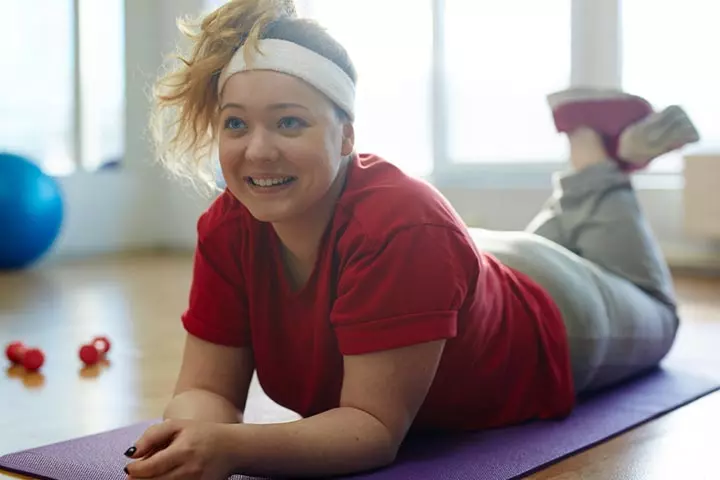
Smiling is the best exercise for your face and can help you get rid of those chubby cheeks. Stand in front of a mirror and smile, hold it for 10-15 seconds and repeat ten times (5).
- Chew A Gum
Chewing gum helps strengthen your jaw and reduce facial fat.
- Blow Out Air
Fill your mouth with air. Move it to the right side of the cheek then slowly move it to the left. Repeat this at least ten times and then blow it out from your mouth. Performing this exercise thrice a day, can help tone your chubby cheeks.
- Cheek Lift
Make an ‘O’ shape with your mouth and tuck your upper lip over your teeth. Smile to lift your cheeks and place fingers on your cheek before releasing the cheek muscles to lower them. Move your cheek up again and repeat this 10 times (5).
- Eyebrow Lift
Use three fingers under each eyebrow to force them to open while you smile to push your eyebrows down against your fingers. Keep your eyes closed and look up. Hold for 20 seconds and then repeat (5).
In a study co-authored by Dr. Murad Alam, vice chair and professor of dermatology, regular facial exercises can help to fight signs of aging. Dr. Alam says, “Now there is some evidence that facial exercises may improve facial appearance and reduce some visible signs of aging. The exercises enlarge and strengthen the facial muscles, so the face becomes firmer and more toned and shaped like a younger face (5).”
3. Reduce Body Mass
- Cardio Workout
Kickboxing, aerobics, running, climbing the steps, brisk walking and high-intensity interval training (HIIT) are all different forms of cardio workouts. You can go ahead and choose a regimen that suits you. Getting fit will help your face look fab from flab!
 Quick fact
Quick fact- Weight Training
According to the CDC, an average healthy adult should aim for at least 150 minutes of moderate-intensity exercise or 75 minutes of vigorous-intensity exercise in a week (6). Exercising with weights helps in skin toning and strengthening the muscles of the body as well as the face. It will help you attain a lean body, a slim face, a defined jawline and slim cheeks too!
4. Get good sleep
The CDC recommends adults get at least 7 hours of sleep a day (7). Getting adequate sleep of 7-8 hours is important for losing weight, including facial weight, as proper sleep helps in hormonal regulation, controls hunger, boosts your metabolism, and reduces stress (8).
If you have a puffy face due to the side effects of a medication, you can ask your doctor to prescribe alternative drugs.
Frequently Asked Questions
1. At what age do people lose facial fat?
As people age, their face and neck appearance may change; consequently, studies have shown that facial thinning (losing facial volume and texture) may begin at around 40 years of age (9).
2. Does blowing balloons reduce face fat?
Although facial exercises (such as the blowing balloon exercise) may help some people, there is a lack of adequate research to prove their effectiveness in reducing facial fat in a large population (10).
3. Can facial massages help reduce baby fat on the face?
Massaging the face may relax muscles and improve circulation. However, they are unlikely to target and reduce baby fat in the face. Genetics and overall body composition primarily determine body fat distribution, including facial fat.
4. What role does genetics play in baby fat on the face?
Genetics determine how much fat will be distributed in different body parts, including the face. However, it is vital to note that genetic factors interact with lifestyle and environmental factors. Therefore, lifestyle choices such as diet, exercise, and overall body weight will also influence the appearance of facial fat (11).
5. Are there any topical creams or treatments that can help reduce baby fat on the face?
Currently, no topical creams or treatments can help spot or target fat reduction, especially on the face. Fat on the face is the subcutaneous fat that can be effectively reduced by maintaining healthy lifestyle habits, such as exercising and maintaining a healthy body weight.
6. How long does it typically take to see results from face fat reduction efforts?
The time needed to observe results from face fat reduction may differ based on factors such as the methods employed, individual metabolism, and body composition. Typically, noticeable changes may appear within weeks to months of consistent effort. It involves regular exercise, a balanced diet, and possibly targeted facial exercises or treatments. It’s crucial to note that spot reduction of facial fat can be difficult, and general weight loss and body fat reduction can gradually contribute to a slimmer face (12).
7. Are there any cosmetic procedures that can help reduce baby fat on the face?
A procedure known as Buccal Fat Pad (BFP) removal can enhance facial appearance by reducing excess fat. However, limited information exists on its long-term effects, necessitating further research and controlled clinical studies to establish sufficient evidence (13).
There could be several reasons for baby fat, including stress, obesity, medication side effects, etc. Like most moms, you may be wondering how to get rid of baby fat on your face after delivery. Knowing the cause and working on discovering appropriate measures could help shed facial fat. Nonetheless, avoiding alcohol, practicing facial exercises, maintaining a healthy, balanced post pregnancy diet, and physical activity could help. Follow these simple tips and incorporate these changes into your lifestyle, and you will soon be able to flaunt your high cheekbones again.
Infographic: Tips To Reduce Facial Fat
Although there may be several medical approaches to getting rid of stubborn facial fat, there are also other less invasive and natural techniques to shape your face. The infographic below suggests a few approaches to reducing excess fat on the face.

Illustration: Momjunction Design Team
Illustration: How To Get Rid Of Baby Fat On Your Face?
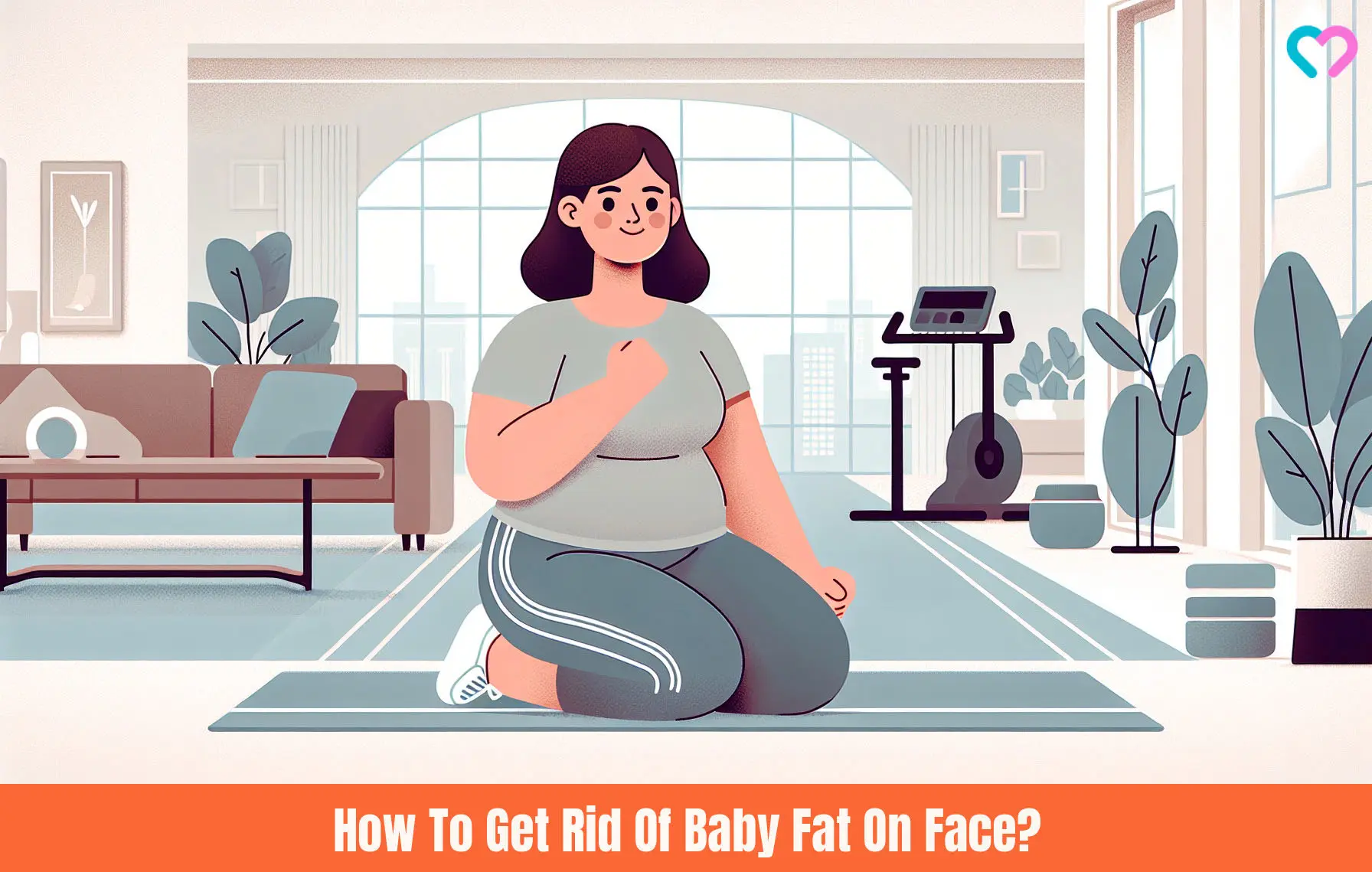
Image: Dall·E/MomJunction Design Team
References
- Justo Sierra-Johnson and Bruce D. Johnson; (2004); Facial fat and its relationship to abdominal fat: a marker for insulin resistance?
https://www.sciencedirect.com/science/article/abs/pii/S0306987704004074 - Moon Face – Moon Facies.
https://my.clevelandclinic.org/health/symptoms/moon-face - Ying Chen and John Lyga; (2014); Brain-Skin Connection: Stress Inflammation and Skin Aging.
https://pmc.ncbi.nlm.nih.gov/articles/PMC4082169/ - How Do I Get Rid of My Pesky Double Chin?
https://health.clevelandclinic.org/how-to-get-rid-of-a-double-chin - Facial Exercises Fight Appearance of Aging.
https://magazine.northwestern.edu/news/facial-exercises-fight-appearance-of-aging - What Counts as Physical Activity for Adults.
https://www.cdc.gov/physical-activity-basics/adding-adults/what-counts.html - FastStats: Sleep in Adults.
https://www.cdc.gov/sleep/data-research/facts-stats/adults-sleep-facts-and-stats.html - How to Lose Weight in Your Face.
https://www.aarp.org/health/healthy-living/info-2024/how-to-lose-face-fat.html - Arthur Swift et al.; (2020); The Facial Aging Process From the “Inside Out”.
https://www.ncbi.nlm.nih.gov/pmc/articles/PMC8438644/ - Marie-Camille De Vos et al.; (2013); Facial exercises for facial rejuvenation: a control group study.
https://pubmed.ncbi.nlm.nih.gov/24296342/ - Su-Hyoun Chon and Apostolos Pappas; (2014); Differentiation and characterization of human facial subcutaneous adipocytes.
https://www.ncbi.nlm.nih.gov/pmc/articles/PMC4496965/ - Get Away from Spot Reducing – It Doesn’t Work that Way.
https://www.econdev.dublinohiousa.gov/get-away-from-spot-reducing-it-doesnt-work-that-way/ - Lucas-Borin Moura et al.; (2018); Buccal fat pad removal to improve facial aesthetics: an established technique?
https://pmc.ncbi.nlm.nih.gov/articles/PMC6051676/
Community Experiences
Join the conversation and become a part of our nurturing community! Share your stories, experiences, and insights to connect with fellow parents.
Read full bio of Dr. Richard Mario Lurshay
Read full bio of Harshita Makvana
Read full bio of Rebecca Malachi
Read full bio of Anindita Ghatak









